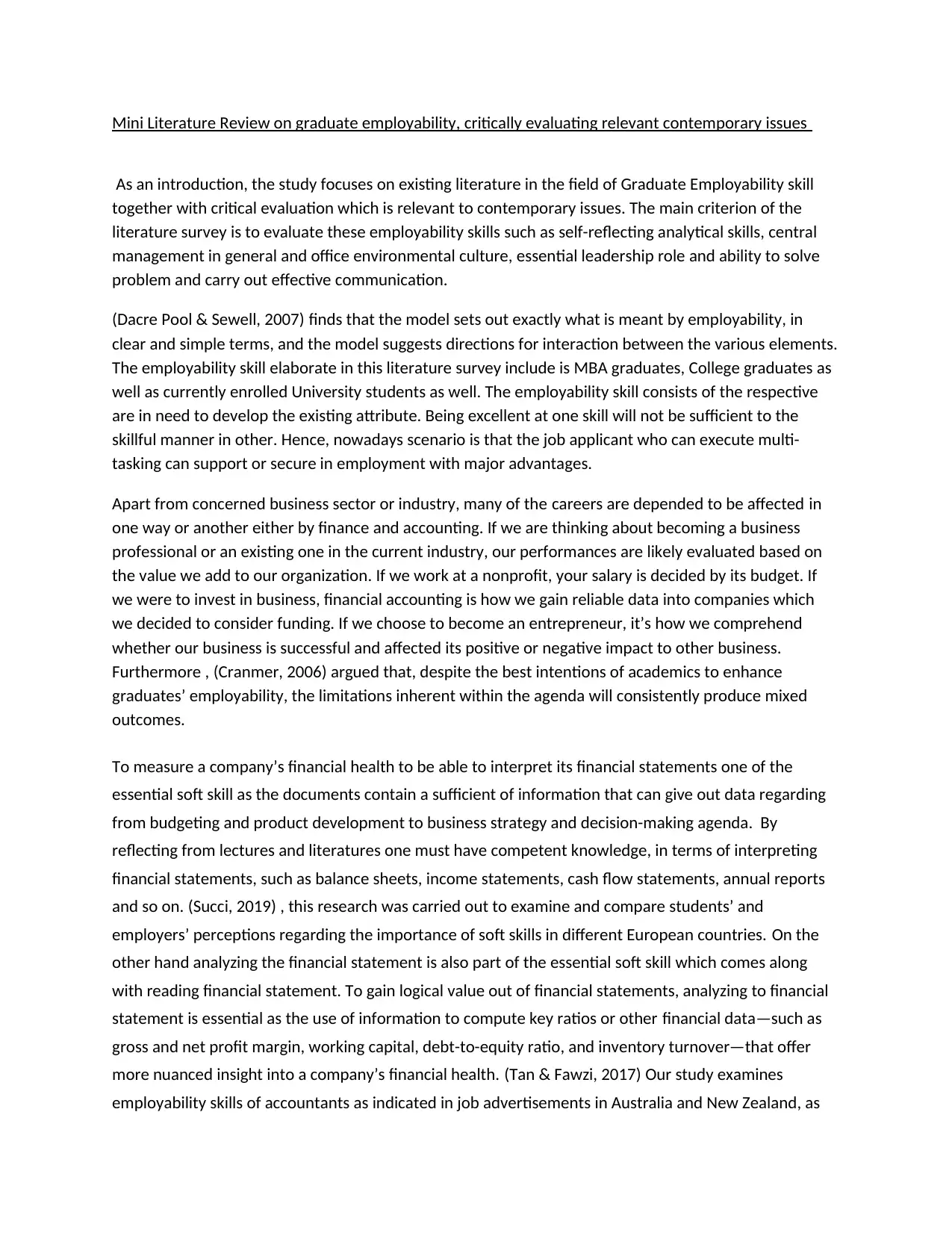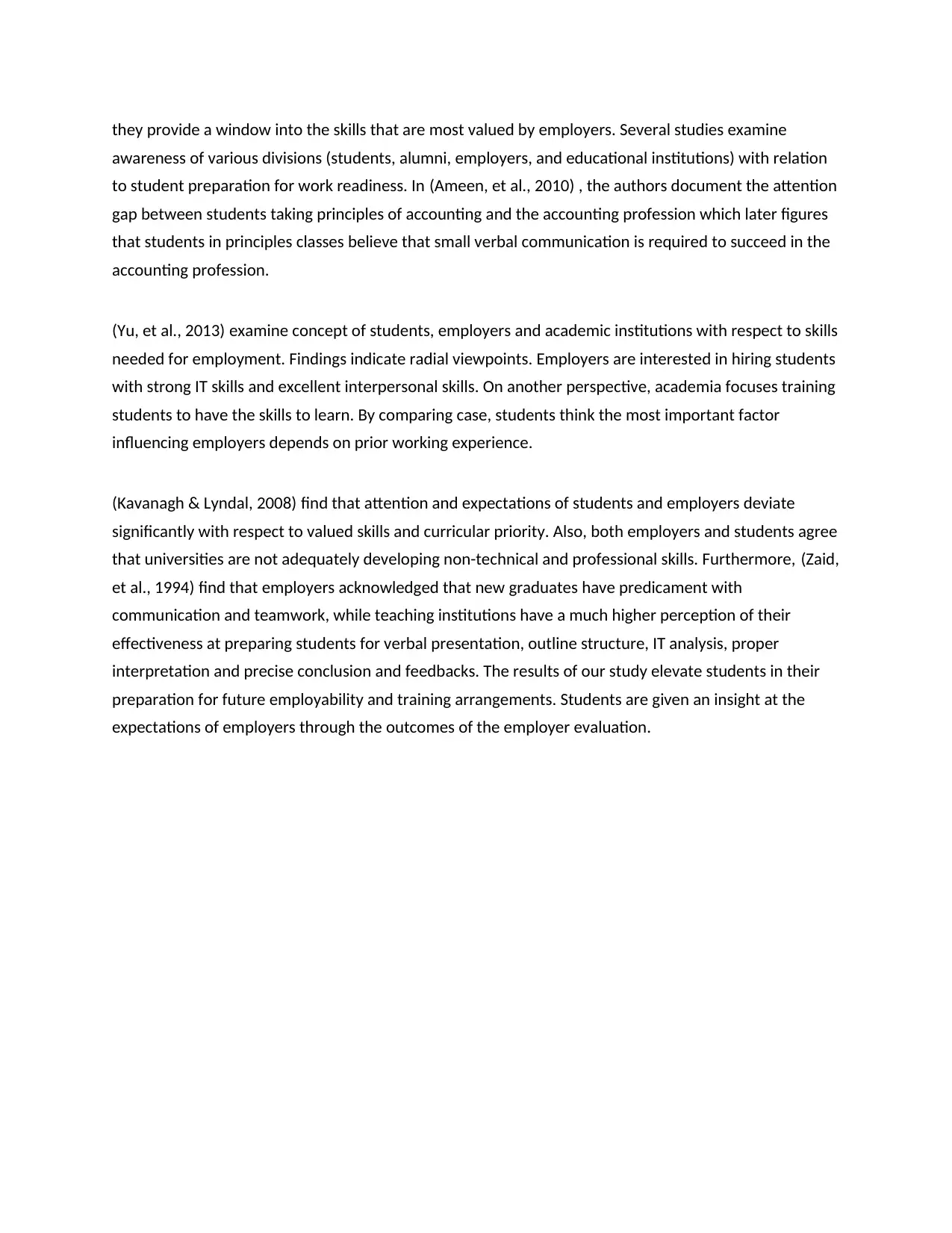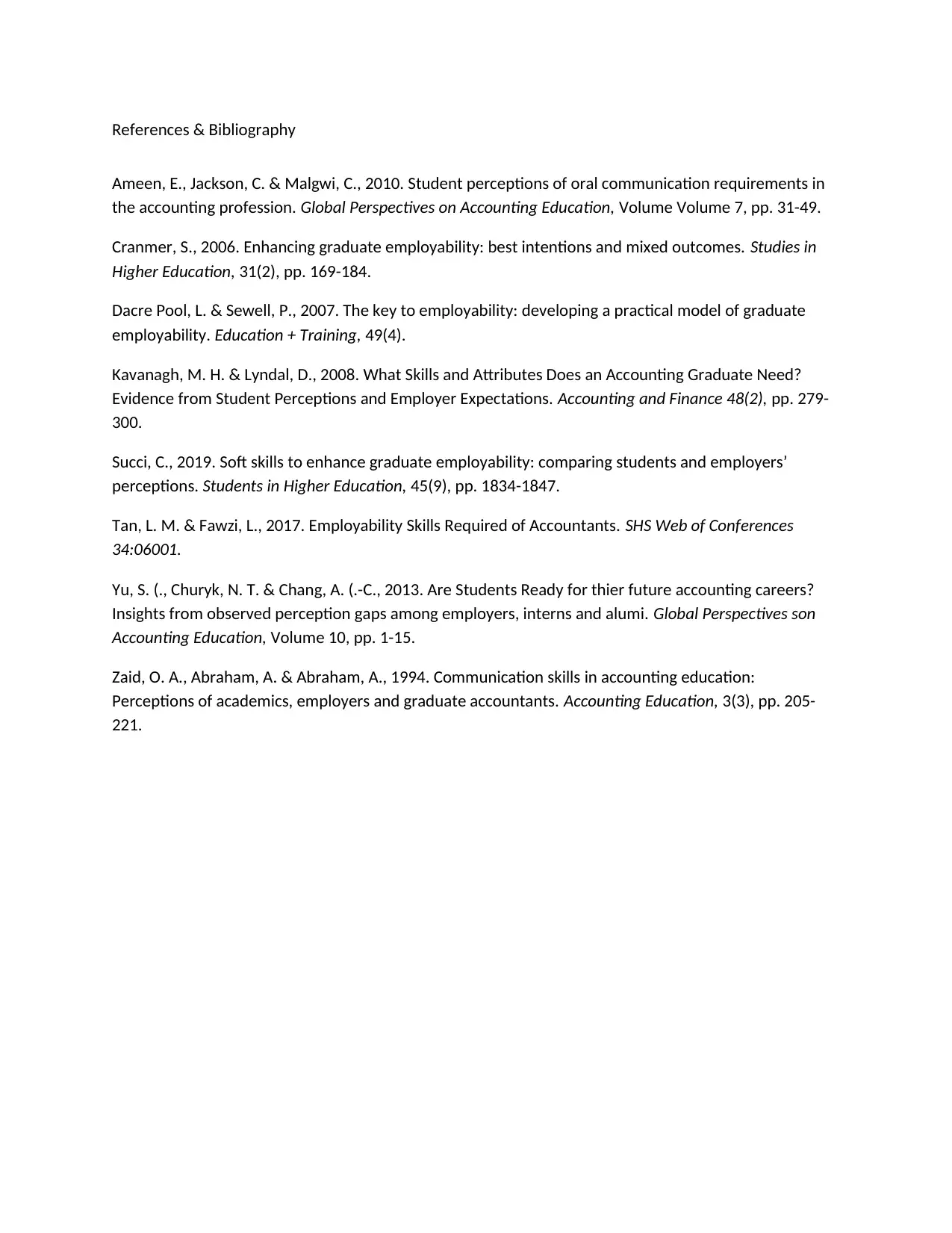Mini Literature Review on Graduate Employability and Issues
VerifiedAdded on 2023/01/18
|3
|1194
|47
Literature Review
AI Summary
This literature review examines existing literature on graduate employability, focusing on essential skills and contemporary issues. It analyzes employability skills such as self-reflection, analytical abilities, management, office culture, leadership, problem-solving, and effective communication. The review references key studies by Dacre Pool & Sewell (2007), Cranmer (2006), Succi (2019), Tan & Fawzi (2017), Ameen et al. (2010), Yu et al. (2013), Kavanagh & Lyndal (2008), and Zaid et al. (1994), comparing perspectives from MBA graduates, college graduates, employers, and students. The analysis emphasizes the importance of multitasking, financial statement analysis, and the gap between academic preparation and employer expectations. The review highlights the need for graduates to possess both technical and soft skills to succeed in the current job market.

Mini Literature Review on graduate employability, critically evaluating relevant contemporary issues
As an introduction, the study focuses on existing literature in the field of Graduate Employability skill
together with critical evaluation which is relevant to contemporary issues. The main criterion of the
literature survey is to evaluate these employability skills such as self-reflecting analytical skills, central
management in general and office environmental culture, essential leadership role and ability to solve
problem and carry out effective communication.
(Dacre Pool & Sewell, 2007) finds that the model sets out exactly what is meant by employability, in
clear and simple terms, and the model suggests directions for interaction between the various elements.
The employability skill elaborate in this literature survey include is MBA graduates, College graduates as
well as currently enrolled University students as well. The employability skill consists of the respective
are in need to develop the existing attribute. Being excellent at one skill will not be sufficient to the
skillful manner in other. Hence, nowadays scenario is that the job applicant who can execute multi-
tasking can support or secure in employment with major advantages.
Apart from concerned business sector or industry, many of the careers are depended to be affected in
one way or another either by finance and accounting. If we are thinking about becoming a business
professional or an existing one in the current industry, our performances are likely evaluated based on
the value we add to our organization. If we work at a nonprofit, your salary is decided by its budget. If
we were to invest in business, financial accounting is how we gain reliable data into companies which
we decided to consider funding. If we choose to become an entrepreneur, it’s how we comprehend
whether our business is successful and affected its positive or negative impact to other business.
Furthermore , (Cranmer, 2006) argued that, despite the best intentions of academics to enhance
graduates’ employability, the limitations inherent within the agenda will consistently produce mixed
outcomes.
To measure a company’s financial health to be able to interpret its financial statements one of the
essential soft skill as the documents contain a sufficient of information that can give out data regarding
from budgeting and product development to business strategy and decision-making agenda. By
reflecting from lectures and literatures one must have competent knowledge, in terms of interpreting
financial statements, such as balance sheets, income statements, cash flow statements, annual reports
and so on. (Succi, 2019) , this research was carried out to examine and compare students’ and
employers’ perceptions regarding the importance of soft skills in different European countries. On the
other hand analyzing the financial statement is also part of the essential soft skill which comes along
with reading financial statement. To gain logical value out of financial statements, analyzing to financial
statement is essential as the use of information to compute key ratios or other financial data—such as
gross and net profit margin, working capital, debt-to-equity ratio, and inventory turnover—that offer
more nuanced insight into a company’s financial health. (Tan & Fawzi, 2017) Our study examines
employability skills of accountants as indicated in job advertisements in Australia and New Zealand, as
As an introduction, the study focuses on existing literature in the field of Graduate Employability skill
together with critical evaluation which is relevant to contemporary issues. The main criterion of the
literature survey is to evaluate these employability skills such as self-reflecting analytical skills, central
management in general and office environmental culture, essential leadership role and ability to solve
problem and carry out effective communication.
(Dacre Pool & Sewell, 2007) finds that the model sets out exactly what is meant by employability, in
clear and simple terms, and the model suggests directions for interaction between the various elements.
The employability skill elaborate in this literature survey include is MBA graduates, College graduates as
well as currently enrolled University students as well. The employability skill consists of the respective
are in need to develop the existing attribute. Being excellent at one skill will not be sufficient to the
skillful manner in other. Hence, nowadays scenario is that the job applicant who can execute multi-
tasking can support or secure in employment with major advantages.
Apart from concerned business sector or industry, many of the careers are depended to be affected in
one way or another either by finance and accounting. If we are thinking about becoming a business
professional or an existing one in the current industry, our performances are likely evaluated based on
the value we add to our organization. If we work at a nonprofit, your salary is decided by its budget. If
we were to invest in business, financial accounting is how we gain reliable data into companies which
we decided to consider funding. If we choose to become an entrepreneur, it’s how we comprehend
whether our business is successful and affected its positive or negative impact to other business.
Furthermore , (Cranmer, 2006) argued that, despite the best intentions of academics to enhance
graduates’ employability, the limitations inherent within the agenda will consistently produce mixed
outcomes.
To measure a company’s financial health to be able to interpret its financial statements one of the
essential soft skill as the documents contain a sufficient of information that can give out data regarding
from budgeting and product development to business strategy and decision-making agenda. By
reflecting from lectures and literatures one must have competent knowledge, in terms of interpreting
financial statements, such as balance sheets, income statements, cash flow statements, annual reports
and so on. (Succi, 2019) , this research was carried out to examine and compare students’ and
employers’ perceptions regarding the importance of soft skills in different European countries. On the
other hand analyzing the financial statement is also part of the essential soft skill which comes along
with reading financial statement. To gain logical value out of financial statements, analyzing to financial
statement is essential as the use of information to compute key ratios or other financial data—such as
gross and net profit margin, working capital, debt-to-equity ratio, and inventory turnover—that offer
more nuanced insight into a company’s financial health. (Tan & Fawzi, 2017) Our study examines
employability skills of accountants as indicated in job advertisements in Australia and New Zealand, as
Paraphrase This Document
Need a fresh take? Get an instant paraphrase of this document with our AI Paraphraser

they provide a window into the skills that are most valued by employers. Several studies examine
awareness of various divisions (students, alumni, employers, and educational institutions) with relation
to student preparation for work readiness. In (Ameen, et al., 2010) , the authors document the attention
gap between students taking principles of accounting and the accounting profession which later figures
that students in principles classes believe that small verbal communication is required to succeed in the
accounting profession.
(Yu, et al., 2013) examine concept of students, employers and academic institutions with respect to skills
needed for employment. Findings indicate radial viewpoints. Employers are interested in hiring students
with strong IT skills and excellent interpersonal skills. On another perspective, academia focuses training
students to have the skills to learn. By comparing case, students think the most important factor
influencing employers depends on prior working experience.
(Kavanagh & Lyndal, 2008) find that attention and expectations of students and employers deviate
significantly with respect to valued skills and curricular priority. Also, both employers and students agree
that universities are not adequately developing non-technical and professional skills. Furthermore, (Zaid,
et al., 1994) find that employers acknowledged that new graduates have predicament with
communication and teamwork, while teaching institutions have a much higher perception of their
effectiveness at preparing students for verbal presentation, outline structure, IT analysis, proper
interpretation and precise conclusion and feedbacks. The results of our study elevate students in their
preparation for future employability and training arrangements. Students are given an insight at the
expectations of employers through the outcomes of the employer evaluation.
awareness of various divisions (students, alumni, employers, and educational institutions) with relation
to student preparation for work readiness. In (Ameen, et al., 2010) , the authors document the attention
gap between students taking principles of accounting and the accounting profession which later figures
that students in principles classes believe that small verbal communication is required to succeed in the
accounting profession.
(Yu, et al., 2013) examine concept of students, employers and academic institutions with respect to skills
needed for employment. Findings indicate radial viewpoints. Employers are interested in hiring students
with strong IT skills and excellent interpersonal skills. On another perspective, academia focuses training
students to have the skills to learn. By comparing case, students think the most important factor
influencing employers depends on prior working experience.
(Kavanagh & Lyndal, 2008) find that attention and expectations of students and employers deviate
significantly with respect to valued skills and curricular priority. Also, both employers and students agree
that universities are not adequately developing non-technical and professional skills. Furthermore, (Zaid,
et al., 1994) find that employers acknowledged that new graduates have predicament with
communication and teamwork, while teaching institutions have a much higher perception of their
effectiveness at preparing students for verbal presentation, outline structure, IT analysis, proper
interpretation and precise conclusion and feedbacks. The results of our study elevate students in their
preparation for future employability and training arrangements. Students are given an insight at the
expectations of employers through the outcomes of the employer evaluation.

References & Bibliography
Ameen, E., Jackson, C. & Malgwi, C., 2010. Student perceptions of oral communication requirements in
the accounting profession. Global Perspectives on Accounting Education, Volume Volume 7, pp. 31-49.
Cranmer, S., 2006. Enhancing graduate employability: best intentions and mixed outcomes. Studies in
Higher Education, 31(2), pp. 169-184.
Dacre Pool, L. & Sewell, P., 2007. The key to employability: developing a practical model of graduate
employability. Education + Training, 49(4).
Kavanagh, M. H. & Lyndal, D., 2008. What Skills and Attributes Does an Accounting Graduate Need?
Evidence from Student Perceptions and Employer Expectations. Accounting and Finance 48(2), pp. 279-
300.
Succi, C., 2019. Soft skills to enhance graduate employability: comparing students and employers’
perceptions. Students in Higher Education, 45(9), pp. 1834-1847.
Tan, L. M. & Fawzi, L., 2017. Employability Skills Required of Accountants. SHS Web of Conferences
34:06001.
Yu, S. (., Churyk, N. T. & Chang, A. (.-C., 2013. Are Students Ready for thier future accounting careers?
Insights from observed perception gaps among employers, interns and alumi. Global Perspectives son
Accounting Education, Volume 10, pp. 1-15.
Zaid, O. A., Abraham, A. & Abraham, A., 1994. Communication skills in accounting education:
Perceptions of academics, employers and graduate accountants. Accounting Education, 3(3), pp. 205-
221.
Ameen, E., Jackson, C. & Malgwi, C., 2010. Student perceptions of oral communication requirements in
the accounting profession. Global Perspectives on Accounting Education, Volume Volume 7, pp. 31-49.
Cranmer, S., 2006. Enhancing graduate employability: best intentions and mixed outcomes. Studies in
Higher Education, 31(2), pp. 169-184.
Dacre Pool, L. & Sewell, P., 2007. The key to employability: developing a practical model of graduate
employability. Education + Training, 49(4).
Kavanagh, M. H. & Lyndal, D., 2008. What Skills and Attributes Does an Accounting Graduate Need?
Evidence from Student Perceptions and Employer Expectations. Accounting and Finance 48(2), pp. 279-
300.
Succi, C., 2019. Soft skills to enhance graduate employability: comparing students and employers’
perceptions. Students in Higher Education, 45(9), pp. 1834-1847.
Tan, L. M. & Fawzi, L., 2017. Employability Skills Required of Accountants. SHS Web of Conferences
34:06001.
Yu, S. (., Churyk, N. T. & Chang, A. (.-C., 2013. Are Students Ready for thier future accounting careers?
Insights from observed perception gaps among employers, interns and alumi. Global Perspectives son
Accounting Education, Volume 10, pp. 1-15.
Zaid, O. A., Abraham, A. & Abraham, A., 1994. Communication skills in accounting education:
Perceptions of academics, employers and graduate accountants. Accounting Education, 3(3), pp. 205-
221.
⊘ This is a preview!⊘
Do you want full access?
Subscribe today to unlock all pages.

Trusted by 1+ million students worldwide
1 out of 3
Related Documents
Your All-in-One AI-Powered Toolkit for Academic Success.
+13062052269
info@desklib.com
Available 24*7 on WhatsApp / Email
![[object Object]](/_next/static/media/star-bottom.7253800d.svg)
Unlock your academic potential
Copyright © 2020–2026 A2Z Services. All Rights Reserved. Developed and managed by ZUCOL.




